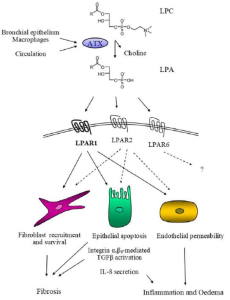Fleming researchers and clinical collaborators have reported increased serum Autotaxin Levels in Severe COVID-19 patients, correlating with serum IL-6 and endothelial dysfunction biomarkers levels, as well as with impaired functions of dendritic cells.
Severe COVID-19 is characterized by acute respiratory distress syndrome (ARDS)-like hyperinflammation and endothelial dysfunction, that can lead to respiratory and multi organ failure and death. Interstitial lung diseases (ILD) and pulmonary fibrosis confer an increased risk for severe disease, while a subset of COVID-19-related ARDS surviving patients will develop a fibroproliferative response that can persist post hospitalization.
 Autotaxin (ATX; ENPP2) is a secreted lysophospholipase D catalyzing the extracellular production of lysophosphatidic acid (LPA), a pleiotropic signaling phospholipid. Genetic and pharmacologic studies in Fleming have previously established a pathologic role for ATX and LPA signaling in pulmonary injury, inflammation, and fibrosis.
Autotaxin (ATX; ENPP2) is a secreted lysophospholipase D catalyzing the extracellular production of lysophosphatidic acid (LPA), a pleiotropic signaling phospholipid. Genetic and pharmacologic studies in Fleming have previously established a pathologic role for ATX and LPA signaling in pulmonary injury, inflammation, and fibrosis.
A new multicenter collaborative study led by Fleming researchers has revealed increased ENPP2 mRNA levels in immune cells from nasopharyngeal swab samples of COVID-19 patients, and increased ATX serum levels in severe COVID-19 patients. ATX serum levels correlated with the corresponding increased serum levels of IL-6 and endothelial damage biomarkers, suggesting an interplay of the ATX/LPA axis with hyperinflammation and the associated vascular dysfunction in COVID-19. Accordingly, dexamethasone (Dex) treatment of mechanically ventilated patients reduced ATX levels, as shown in two independent cohorts, indicating that the therapeutic benefits of Dex include the suppression of ATX. Moreover, large scale analysis of multiple single cell RNAseq datasets revealed the expression landscape of ENPP2 in COVID-19 and further suggested a role for ATX in the homeostasis of dendritic cells, that exhibit both numerical and functional deficits in COVID-19.
Therefore, ATX has likely a multifunctional role in COVID-19 pathogenesis. Moreover, the increased levels of ATX in ILDs/IPF, ARDS and COVID-19 add yet another commonality between them and suggest that LPA signaling is involved in their pathogenesis, including the amplification of vascular damage, the regulation of the immune system and the promotion of fibrosis. Most importantly, the therapeutic targeting of ATX in IPF and fibrotic diseases could be also applied in COVID-19, alone or together with approved anti-fibrotic, anti-rheumatic and anti-viral drugs, especially given its predicted short-term administration, as well as the emergency nature and unmet medical need for the treatment of COVID-19 severe cases.